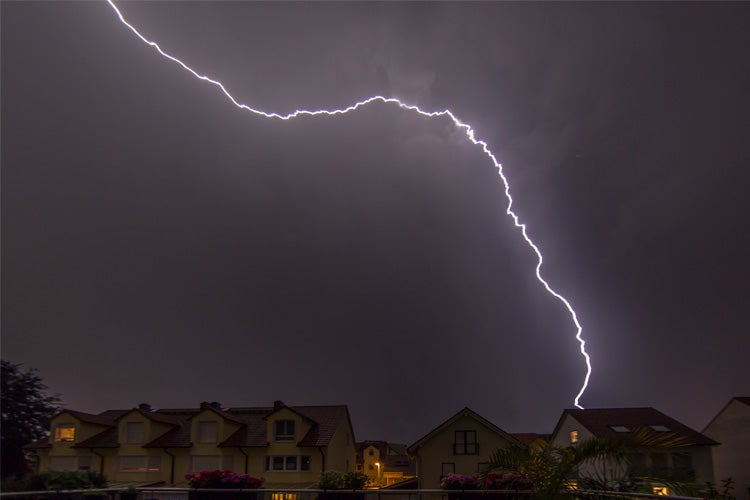
Popular myths and even songs would have you believe that lightning never strikes the same place twice. But is this really true? What about the other common lightning myths in Tennessee?
Knowing the real facts about lightning can help keep you, your family, and your property safe. A Tennessee independent insurance agent can help you get covered with the right homeowners insurance to help. But first, here's a look at a few common lightning myths that can be debunked.
Myth #1: Lightning Never Strikes Twice
This popular saying just isn't true. In fact, lightning tends to strike tall and pointed objects repeatedly. The Statue of Liberty is actually hit by lightning around 600 times per year.
The Statue of Liberty gets struck by lightning 600 times annually.
Myth #2: Lightning Always Accompanies Rain
Another myth that can be completely busted, since lightning often seems to appear by itself. If you've ever seen a lightning storm illuminating the sky, you might have been told it was "heat lightning." Actually, it's just lightning that's striking too far away from the thunderstorm for you to hear the thunder claps.
This type of lightning, also sometimes called "silent lightning" or even "bolts from the blue," can hit as far as 15 miles away from a thunderstorm. So just because you don't see rain or hear thunder when lightning flashes, that doesn't mean it's not happening out there somewhere.
Myth #3: Touching Someone Who’s Been Electrocuted Will Electrocute You Too
This myth can be deadly, since victims of lightning strikes are often in need of immediate medical attention. Thankfully EMTs are trained to know that electricity isn't stored within the body of these victims and cannot be transferred to them. If you see a lightning strike victim, it's safe for you to apply treatment and even CPR.
Myth #4: During a Storm, Keeping Dry and Hidden under a Tall Tree Is Safe
Remember that lightning does strike repeatedly in one area, especially tall objects. Trees are among the tallest natural lightning rods around. Never shelter from lightning underneath a tree, it'll just create more danger and greater risk of being struck.
Myth #5: Lighting Can't Hit You If You're Inside
Well, being indoors can be a great start to sheltering and protecting yourself against lightning, but you're not automatically safe just because you're inside. Rather, it's what you do while inside that will keep you safe. While indoors during a storm, it's crucial to:
- Not use or touch plugged-in appliances or electronics like computers, wires and TV cables, corded phones, etc.
- Not touch plumbing or anything metallic like windows and doors.
- Keep your distance from windows to avoid wind gusts and the possibility of lightning entering through the sides.
It is generally much safer to be indoors during a thunderstorm, but it's especially important to follow these guidelines while inside to avoid being struck.
Myth #6: Lightning Is Always Attracted to Metal
Metal can be a conduit for lightning, which is why it's important not to touch metallic objects during a storm, but its presence doesn't automatically attract a strike. Instead, objects that are pointed, tall, and standing apart from other objects are what really attract lightning strikes. So while you should keep your distance from metal during a storm, it's not necessary to stress over it just being in the same room.
Myth #7: You Should Lie Flat on the Ground When Outside During a Storm
If you have nowhere to shelter indoors during a storm, it does help to crouch down close to the ground. But you should keep as much of your body off the ground as possible. If you lie down flat on the ground and lightning strikes somewhere nearby, you have the greatest risk of absorbing some of the grounded current.
Of course, the safest practice is always to seek shelter indoors during a storm. However, this isn't always possible. Just remember that if you find yourself outside when lightning is active, stay away from trees and other tall, isolated objects, and crouch down to the ground but never lie flat.
Simple Tips to Protect Your Home from Lightning Strikes
You might not expect lightning to ever damage your home, especially if there are no tall, pointy objects around it. However, it could still happen.
Homeowner insurance claims paid out due to lightning losses in the US

The amount paid out by insurance companies to homeowners for lightning losses has greatly increased over the years. At the beginning of the observed period, home insurance companies paid out $882 million to homeowners for lightning claims. In one recent year, this number jumped to $2.066 billion.
With damage from lightning costing more to homeowners as time goes on, it's critical to follow these simple steps to protect your home:
- Install surge protectors: These protect your expensive electronics like computers and TVs from currents that may pass through your outlets.
- Get a lightning protection system: These help ground currents from lightning strikes, but don't attract strikes in the first place.
- Inventory your belongings: This can help you file any claims for damage or loss if a storm does hit your property.
- Get the right homeowners insurance: Having Tennessee homeowners insurance can protect your property from lightning losses.
A Tennessee independent insurance agent can help you get covered with the right homeowners insurance policy to protect your home and belongings from lightning damage and destruction.
Does Tennessee's Lightning Coverage Differ from Other States'?
According to insurance expert Paul Martin, Tennessee's lightning coverage under homeowners insurance is the same as it is everywhere else. He added that lightning and fire are the two priority disasters covered by all home insurance policies. As long as you're equipped with home insurance, you can rest assured that you've got protection from lightning.
Your home insurance policy will cover damage or destruction to your home's dwelling as well as your personal property like furniture, etc. Coverage is automatically included in your homeowners insurance and doesn't need to be added.
Why Choose a Tennessee Independent Insurance Agent?
Tennessee independent insurance agents simplify the process by shopping and comparing insurance quotes for you. Not only that, but they’ll also cut the jargon and clarify the fine print so you know exactly what you’re getting.
Tennessee independent insurance agents also have access to multiple insurance companies, ultimately finding you the best home insurance coverage, accessibility, and competitive pricing while working for you.
Author | Chris Lacagnina
Article Reviewed by | Paul Martin
https://www.weather.gov/safety/lightning-myths
https://artsandculture.google.com/story/5-things-you-may-not-know-about-the-statue-of-liberty/hgWBLOYeOkTxmQ?hl=en
https://www.statista.com/statistics/217216/payout-for-lightning-losses-by-us-homeowners-insurers/
https://www.weather.gov/safety/lightning-heat
© 2025, Consumer Agent Portal, LLC. All rights reserved.